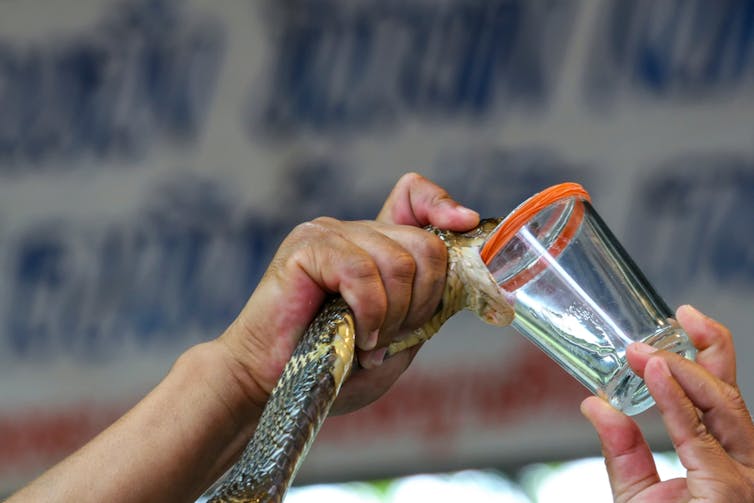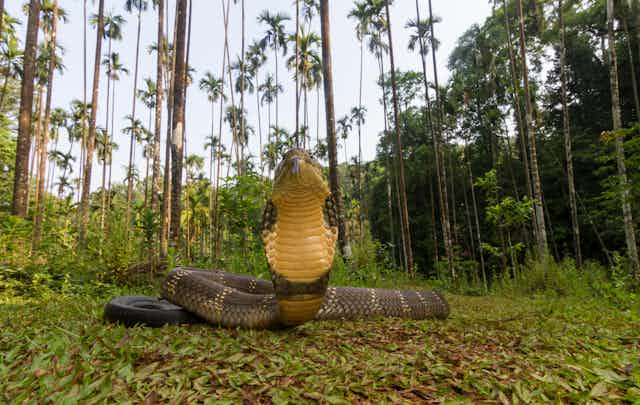If you’re bitten by a venomous snake, the medicine you need is antivenom. Unfortunately, antivenoms are species specific, meaning you need to have the right antivenom for the snake that bit you. Most of the time, people have no idea what species of snake has bitten them. And for some snakes, antivenoms are simply not available.
New research my colleagues and I conducted provides a significant step forward in enabling the development of an antivenom that will neutralise the effects of venom from any venomous snake: a so-called “universal antivenom”.
In our paper, published in Science Translational Medicine, we describe the discovery and development of a laboratory-made antibody that can neutralise a neurotoxin (a toxin that acts on the nervous system) found in the venom of many types of snake around the world.
Venomous snakes kill as many as 138,000 people each year, with many more survivors suffering from life-changing injuries and mental trauma. Children and farmers make up the bulk of the victims.
The active ingredients in antivenoms are anti-toxin antibodies. They are made by injecting horses with small quantities of snake venom and harvesting the antibodies. This method of making antivenom has remained the same for over a century – and it has substantial drawbacks.
In addition to antivenoms being species specific, they are also not very potent, so you need lots of antivenom to neutralise the venom from a bite.
Also, because antivenoms are made in horses, you are highly likely to experience severe side-effects when administered, as your body’s immune system will detect and react to the “foreign” horse antibodies circulating in your bloodstream.
Antibodies that are made in the laboratory using genetically modified cells are routinely used in humans to treat cancers and immune disorders. A long-held hope is that the technology used to produce these antibodies can be used to make antivenom and eventually replace traditional antivenoms, thereby solving many of the issues current antivenoms face.
The antibodies in lab-made antivenoms could be “humanised”, a process that tricks your immune system into thinking foreign antibodies are your own antibodies. This might reduce the rate of severe side-effects that are commonly encountered with horse-derived antivenoms.
Paralysis and death avoided
One of the most important families of toxins in snake venoms are neurotoxins.
These toxins prevent nerve signals from travelling from your brain to your muscles, paralysing them. This includes paralysing the muscles that inflate and deflate your lungs, so prey and human victims quickly stop breathing and die.
These neurotoxins are in the venoms of some of the world’s most deadly snakes, including the African black mamba, the Asian monocled cobra and king Cobra, and the deadly kraits of the Indian subcontinent.
In our research, we describe the discovery and development of a lab-made humanised antibody that can neutralise key venom neurotoxins from diverse snakes from diverse regions.
The lab-made antibody is called 95Mat5 and was discovered after examining 50 billion unique antibodies to find ones capable of not only recognising the neurotoxin in the venoms of many species but also able to neutralise its deadly effects.
When injected into mice that had received lethal doses of venom, 95Mat5 was able to prevent paralysis and death in all the venoms tested.

These results are particularly exciting as they show that generating lab-made antibodies that can broadly neutralise the effects of venoms from many species is feasible, making the development of a universal antivenom a realistic prospect.
However, 95Mat5 is a single antibody that only works against neurotoxins. As we said earlier, to make a universal antivenom you will require a handful of antibodies. This is because snake venoms don’t just consist of neurotoxins.
Some snake venoms have haemotoxins, which make you bleed, and some have cytotoxins, which destroy skin and bone. To create a universal antivenom, capable of treating any bite from any snake, we still need to identify additional antibodies that can broadly and potently neutralise the other toxin types, in the same manner as 95Mat5.
We hope that once identified, these antibodies can be mixed with 95Mat5 to make an antivenom that is capable of neutralising the venom of any snake, no matter what toxin types it possesses.

The requirement for antibodies for other venom toxins and also the need to ensure any new lab-made antivenom for effectiveness and safety in human trials means it will still take many years for a universal antivenom to become available to snakebite victims.
Other hurdles need to be overcome. These new antivenoms will probably need to be stored in a fridge to prevent loss of effectiveness, so it will need to be shown that they can be distributed in often warm regions of the world that don’t have reliable electricity for refrigeration.
Lab-made antibodies are some of the most expensive drugs on the planet. While we are hopeful, it remains to be seen if lab-made antivenoms will be affordable for most snakebite victims, who are usually some of the poorest people in the world.

